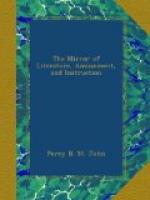These were the women’s share of the mischief; but I was not long without administering in person to our unpopularity. The report of my fortune had, as usual, been enormously exaggerated; and every man who had a debt to pay, or a purchase to make, conceived himself “bound to apply first to his old and excellent friend, to whom the accommodation for a month or two must be such a trifle.” If I had listened to a tenth of those compliments, “their old and excellent friend” would have only preceded them to a jail. In some instances I complied, and so far only showed my folly; for who loves his creditor? My refusal of course increased the host of my enemies; and I was pronounced purse-proud, beggarly, and unworthy of the notice of the “true gentlemen, who knew how to spend their money.”
Yet, though I was to be thus abandoned by my fox-hunting friends, I was by no means to feel myself the inhabitant of a solitary world. If the sudden discovery of kindred could cheer me under my calamities, no man might have passed a gayer life. For a long succession of years I had not seen a single relative. Not that they altogether disdained even the humble hospitalities of my cottage, or the humble help of my purse; on the contrary, they liked both exceedingly, and would have exhibited their affection in enjoying them as often as I pleased.
But I had early adopted a resolution, which I recommend to all men. I made use of no disguise on the subject of our mutual tendencies. I knew them to be selfish, beggarly in the midst of wealth, and artificial in the fulness of protestation. I disdained to play the farce of civility with them. I neither kissed nor quarrelled with them; but I quietly shut my door, and at last allowed no foot of their generation inside it. They hated me mortally in consequence, and I knew it. I despised them, and I conclude they knew that too. But I was resolved that they should not despise me; and I secured that point by not suffering them to feel that they had made me their dupe. The nabob’s will had not soothed their tempers; and I was honoured with their most smiling animosity.
But now, as if they were hidden in the ground like weeds only waiting for the shower, a new and boundless crop of relationship sprang up. Within the first fortnight after my return, I was overwhelmed with congratulations from east, west, north, and south; and every postscript pointed with a request for my interest with boards and public offices of all kinds; with India presidents, treasury secretaries, and colonial patrons, for the provision of sons, nephews, and cousins, to the third and fourth generation.
My positive declarations that I had no influence with ministers were received with resolute scepticism. I was charged with old obligations conferred on my grandfathers and grandmothers; and, finally, had the certain knowledge that my gentlest denials were looked upon as a compound of selfishness and hypocrisy. Before a month was out, I had extended my sources of hostility to three-fourths of the kingdom, and contrived to plant in every corner some individual who looked on himself as bound to say the worst he could of his heartless, purse-proud, and abjured kinsman.




